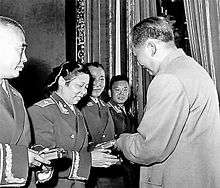Li Zhen (general)
| Major General Li Zhen | |
|---|---|
| 李贞 | |
 Li Zhen being awarded the rank of major general by Mao Zedong | |
| Personal details | |
| Born |
February, 1908 Xiaobanqiao Village, Liuyang County, Hunan, Great Qing |
| Died | March 11, 1990 |
| Spouse(s) |
Gu Tianshun (m. 1924; div. 1928) Zhang Qilong (m. 1932; div. 1933) Gan Siqi (m. 1935; d. 1964) |
| Parents | Li Guangtian |
| Military service | |
| Allegiance |
|
| Service/branch | People's Liberation Army Ground Force |
| Rank | Major General |
| Battles/wars | Autumn Harvest Uprising, Long March |
Li Zhen (Chinese: 李贞) was the first female general of the Chinese People's Liberation Army.[1]
Early Life
Li was born the sixth daughter to a peasant family in rural Hunan. Her family farmed fields measuring 2 and a half mu and had caught fish to supplement their diet.[2] Until the age of 18, Li was referred to as Danwazi (Chinese: 旦妹子). At age six, she was sent to live with the family of her intended husband, Gu Tianshun, whose father was a doctor.[2] Li formally married Gu at age 16.[3]
Revolution
In 1926, Danwazi signed up to Yonghe district women's organisation using the name Li Zhen.
In 1927, Li joined the Communist Party of China, acting as a scout for the local communists.[3] During this time, Li led a group to collect grain and recruit soldiers.[4] She was based in Yonghe, but remained married to Gu.[4] Later that year, a clash between the Communists and the Kuomintang resulted in several deaths and Li's name being put on a wanted list. As a result, Gu's family severed their ties with Li, sending her mother notification of divorce.[4]
By 1928, Li was a member of the District Committee and deputy secretary of the Party Branch of the Pingliu Guerillas. She became head of the Liudong Guerilla Unit Soldiers' Committee (Chinese: 士兵委员会), later known as the Liuyang County Party Committee (Chinese: 浏阳县委).[3] During one winter incident, Li and her guerilla unit were encircled by KMT forces. They fought until night and, with no more bullets, the seven surviving members of the troop retreated until they were hemmed in with no escape other than a cliff behind them. Li gave the order to avoid being taken alive and promptly jumped down the cliff. She landed on a tree and, after regaining consciousness, she and one other survivior buried their comrades.[2]
When the Autumn Harvest Uprising began in 1928, there were few members of the proletariat willing to join Mao Zedong and Li is credited with rallying members of her troop to join the fighting.[2]
The Long March
In 1934, the Red Army prepared to abandon the Hunan-Jiangxi base area and it was suggested to Li by one of her superiors that she remain behind, as, 'fighting was so hard for women.'[3] Li objected to the higher administration and was permitted to continue her work. Her unit was first assigned to the Sixth Corps under Ren Bishi, which then amalgamated with General He Long's forces to form the Second Red Army.[3] In 1935, the Second Red Army retreated through Sichuan into Tibet to join Zhang Guotao's forces. Early in the year, Li had married her third husband Gan Siqi.[3]
References
- ↑ "Li Zhen Is Dead at 83; Chinese Army General". New York Times. 25 March 1990. Retrieved 26 November 2016.
- 1 2 3 4 Wu 吴, Zhife 志菲 (2003). "Li Zhen: cong tongyangxi dao kaiguo jiangjun 李贞:从童养媳到开国将军". Renmin Wang. Retrieved 27 November 2011.
- 1 2 3 4 5 6 Wiles, Sue (2015). "Li Zhen". In Lee, Lily Xiao Hong; Stefanowska, A. D.; Ho, Clara Wing-chung. Biographical Dictionary of Chinese Women: The Qing Period 1644-1911. Oxford: Routledge. ISBN 978-0-7656-0798-0.
- 1 2 3 Liao 廖, Chunmei 春梅 (12 December 2013). "Xinzhongguo di yi wei nv jiangjun li zhen de kanke hunyin 新中国第一位女将军李贞的坎坷婚姻". Zhongguo Gongchangdang Xinwen Wang. Retrieved 27 November 2011.